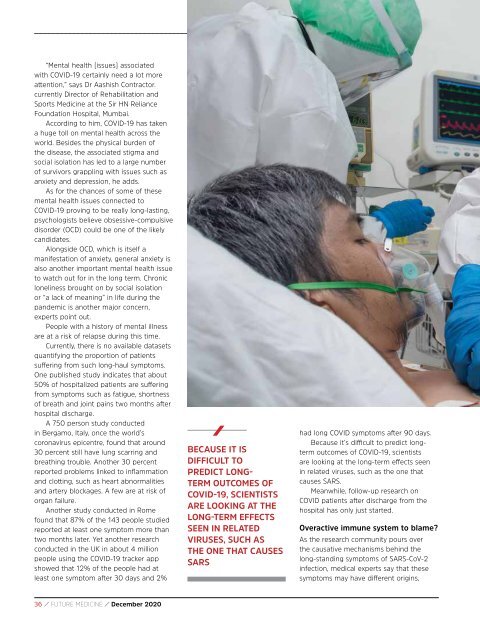You also want an ePaper? Increase the reach of your titles
YUMPU automatically turns print PDFs into web optimized ePapers that Google loves.
“Mental health [issues] associated<br />
with COVID-19 certainly need a lot more<br />
attention,” says Dr Aashish Contractor.<br />
currently Director of Rehabilitation and<br />
Sports Medicine at the Sir HN Reliance<br />
Foundation Hospital, Mumbai.<br />
According to him, COVID-19 has taken<br />
a huge toll on mental health across the<br />
world. Besides the physical burden of<br />
the disease, the associated stigma and<br />
social isolation has led to a large number<br />
of survivors grappling with issues such as<br />
anxiety and depression, he adds.<br />
As for the chances of some of these<br />
mental health issues connected to<br />
COVID-19 proving to be really long-lasting,<br />
psychologists believe obsessive-compulsive<br />
disorder (OCD) could be one of the likely<br />
candidates.<br />
Alongside OCD, which is itself a<br />
manifestation of anxiety, general anxiety is<br />
also another important mental health issue<br />
to watch out for in the long term. Chronic<br />
loneliness brought on by social isolation<br />
or “a lack of meaning” in life during the<br />
pandemic is another major concern,<br />
experts point out.<br />
People with a history of mental illness<br />
are at a risk of relapse during this time.<br />
Currently, there is no available datasets<br />
quantifying the proportion of patients<br />
suffering from such long-haul symptoms.<br />
One published study indicates that about<br />
50% of hospitalized patients are suffering<br />
from symptoms such as fatigue, shortness<br />
of breath and joint pains two months after<br />
hospital discharge.<br />
A 750 person study conducted<br />
in Bergamo, Italy, once the world’s<br />
coronavirus epicentre, found that around<br />
30 percent still have lung scarring and<br />
breathing trouble. Another 30 percent<br />
reported problems linked to inflammation<br />
and clotting, such as heart abnormalities<br />
and artery blockages. A few are at risk of<br />
organ failure.<br />
Another study conducted in Rome<br />
found that 87% of the 143 people studied<br />
reported at least one symptom more than<br />
two months later. Yet another research<br />
conducted in the UK in about 4 million<br />
people using the COVID-19 tracker app<br />
showed that 12% of the people had at<br />
least one symptom after 30 days and 2%<br />
BECAUSE IT IS<br />
DIFFICULT TO<br />
PREDICT LONG-<br />
TERM OUTCOMES OF<br />
COVID-19, SCIENTISTS<br />
ARE LOOKING AT THE<br />
LONG-TERM EFFECTS<br />
SEEN IN RELATED<br />
VIRUSES, SUCH AS<br />
THE ONE THAT CAUSES<br />
SARS<br />
had long COVID symptoms after 90 days.<br />
Because it’s difficult to predict longterm<br />
outcomes of COVID-19, scientists<br />
are looking at the long-term effects seen<br />
in related viruses, such as the one that<br />
causes SARS.<br />
Meanwhile, follow-up research on<br />
COVID patients after discharge from the<br />
hospital has only just started.<br />
Overactive immune system to blame?<br />
As the research community pours over<br />
the causative mechanisms behind the<br />
long-standing symptoms of SARS-CoV-2<br />
infection, medical experts say that these<br />
symptoms may have different origins,<br />
36 / FUTURE MEDICINE / <strong>December</strong> <strong>2020</strong>

















